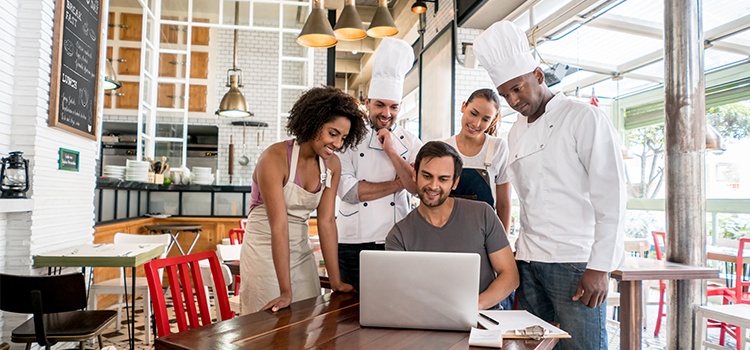Work While Attending Culinary School
Many culinary arts students work while going to culinary school. Find out what your options are.

If you're like most people, you lead a busy life. Balancing work and family is already challenging, but you do want to go back to school to get a raise or to get the training you need to enter the culinary industry.
There are many benefits to working while you go to culinary school. Working while going to school not only creates positive cash-flow, but it also reinforces what you learned in school and will help prepare you for the demands of the culinary profession.
Culinary School Externships
Culinary externships are a staple of culinary school curricula, regardless of whether or not you decide to have a job outside of culinary school. Before graduation, most schools require the completion of a 200-hour (or more) externship in a real world, high-pressure kitchen. During your externship, you'll begin to synthesize all of the skills and techniques that you learned in the classroom. Some externships pay a small wage. Other programs are unpaid.
On the Job Training
- Internship – Practical cooking experience in the school's own baking, dining or banquet facilities.
- Externship – Practical cooking experience sponsored by the school, gained in a restaurant, hotel or club.
- Apprenticeship – On-the-job training program that combines technical classroom instruction with practical kitchen experience.
Culinary School Apprenticeships
An apprenticeship is a period of time, usually three years, during which a novice cook works under a skilled professional to learn the culinary arts in a hotel, club or restaurant. The American Culinary Federation (ACF) requires that apprentices be at least 17 years old and have a high school diploma or GED.
The ACF certifies apprenticeship instructors based primarily on their experience and formal training. Apprenticeships often provide compensation; however, there are basic costs for participation in these programs.
International Cooking Experience
For students who have international interests, many U.S. schools offer externships in France, England, Spain and Italy among other countries. Experiencing different languages, ingredients and cuisines is a key component of a valuable culinary education. This experience is also one that you'll bring back with you, and will give you an added advantage when looking for a job in the U.S.
Balancing Work and School
There are some general rules to follow when balancing education with the demands of your busy life. These rules will make your culinary school experience more fulfilling and help you attain a degree in culinary arts.
- Organize your space and time – Not all homework happens in the kitchen, so it's important to make a space at home where you feel comfortable. Find a spot where you can avoid distractions, and easily read and study. Set a block of time aside, and use that time every day to do homework or study for your cooking program.
- Make sure that you have downtime – All work and no play leads to burn-out. If you're serious about your culinary studies, you'll want to work hard, but also find time for what you like to do. Use your hobby to unwind after your school work is done for the day. If that means taking a walk in the neighborhood, playing tennis, or watching your favorite TV show, make sure to reward yourself for a job well done. This will also help you manage stress, and ultimately help you earn your cooking certificate or degree.
- Set your sight on the goal – When things pile up, they may seem more stressful than they need to be. Make sure to focus on your goal, and remember why you decided to go to culinary school. The work you put in now will pay off in the end, with the ultimate goal of getting a raise or a new job in the culinary industry.
FIND A CULINARY SCHOOL TODAY
Tell us a little about yourself and we'll connect you with schools that offer culinary arts programs.
